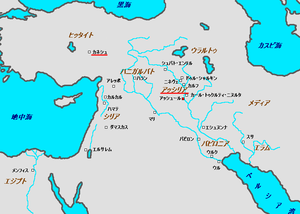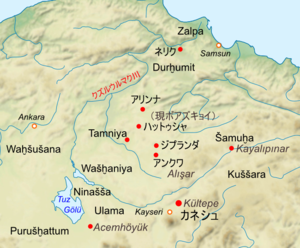「ハンナハンナ」の版間の差分
(→その他の祖神) |
|||
| 26行目: | 26行目: | ||
祖母女神アマンマ(Ammamma)(ヒッタイト語の''amma-''はおそらく母という意味)も知られている。アマンマは自然と豊穣の女神である<ref>Piotr Taracha: ''Religions of Second Millennium Anatolia''. Wiesbaden 2009, S. 57.</ref>。 | 祖母女神アマンマ(Ammamma)(ヒッタイト語の''amma-''はおそらく母という意味)も知られている。アマンマは自然と豊穣の女神である<ref>Piotr Taracha: ''Religions of Second Millennium Anatolia''. Wiesbaden 2009, S. 57.</ref>。 | ||
| − | == | + | == ハンナハンナと聖書のハンナ == |
Although '''Ḫannaḫanna''' is similar to the [[Bible|Biblical]] name [[Hannah (Bible)|Hannah]], mother of [[Samuel]] (according to [[1 Kings]]), the [[Canaan]]ite [[Anat]], and the [[Christians|Christian]] [[Saint Anne]], these are coincidental. The names Anne and Hannah derive from [[Hebrew]] ''Channah'', meaning "favor" or "grace," <ref>http://www.behindthename.com/name/hannah</ref> while Anat may be from a [[Semitic languages|Semitic]] root meaning "water spring."<ref>http://www.behindthename.com/name/anat-1</ref> | Although '''Ḫannaḫanna''' is similar to the [[Bible|Biblical]] name [[Hannah (Bible)|Hannah]], mother of [[Samuel]] (according to [[1 Kings]]), the [[Canaan]]ite [[Anat]], and the [[Christians|Christian]] [[Saint Anne]], these are coincidental. The names Anne and Hannah derive from [[Hebrew]] ''Channah'', meaning "favor" or "grace," <ref>http://www.behindthename.com/name/hannah</ref> while Anat may be from a [[Semitic languages|Semitic]] root meaning "water spring."<ref>http://www.behindthename.com/name/anat-1</ref> | ||
2020年3月16日 (月) 08:41時点における版
ハンナハンナ(Ḫannaḫanna)(ヒッタイト語の「ハンナ(祖母)」という言葉に由来する)はハッティ族の母神で、「偉大な祖母」という意味である[1]。ハンナハンナはメソポタミアの母神ディンギルマー(ニンフルサグ)と同一視された[2]。
ハンナハンナは楔型文字でDINGIR.MAḪ(「偉大なる神」の意)と書かれ、時にはNIN.TUと表され、フリギアの女神キュベレーの前身の一つと考えられている。[3]
クリストファー・シレンはハンナハンナはガルセスと関連していると述べている。
役割と信仰
ハンナハンナは母神として出産を司った。出産の儀式では、彼女が着座する場所が定められていなかったが、その代わりに妊婦の傍らにいるとされた[4]。ハンナハンナはカールム・カネシュで重要な女神とされた[5]。
神話
テリピヌが姿を消した後、父である嵐神タルフント(あるいはテシュブ)はハンナハンナに苦情を言った。ハンナハンナはテリピヌ捜索のためタルフントを送り出した。タルフントが諦めるとハンナハンナはテリピヌを見つけるよう命令し、ミツバチを派遣した。ミツバチはテリピヌを見つけると、手足を刺し、目と足を蜜蝋で拭いて、神を清め、強くした。
彼女は、海神の娘である自分とテリピヌの結婚のために、結納金をタルフントから海神に支払わせた。
イナラに相談を受けて、ハンナハンナはイナラに一人の男と土地を与えた。ほどなくしてイナラは行方不明になり、ハンナハンナは嵐神のミツバチからこの知らせを受けると、侍女に手伝わせて捜索を始めたようだ。どうやら、デーメーテールのようにハンナハンナは怒りのあまりしばらく姿を消し、彼女が隠れている間、牛や羊は窒息し、人や動物の母親は我が子を顧みなくなった。
彼女の怒りが黄泉の国に払われると、女神は喜びを取り戻し、母親達は再び家族を世話し始めた。ハンナハンナの怒りを払う他の方法は、そだを燃やし、蒸気が女神の体内に入ることだった。この文書や他の文書で、ハンナハンナは太陽神や戦争の神に相談しているようだが、文書の多くは欠落している。
その他の祖神
ハンナハンナだけがヒッタイトの神殿の祖神というだけではなかった。
天候神の父であり、別の天候神の祖父神でもあるフッハ(Ḫuḫḫa)(ヒッタイト語のḫuḫḫa-は祖父という意味)がいた。
祖母女神アマンマ(Ammamma)(ヒッタイト語のamma-はおそらく母という意味)も知られている。アマンマは自然と豊穣の女神である[6]。
ハンナハンナと聖書のハンナ
Although Ḫannaḫanna is similar to the Biblical name Hannah, mother of Samuel (according to 1 Kings), the Canaanite Anat, and the Christian Saint Anne, these are coincidental. The names Anne and Hannah derive from Hebrew Channah, meaning "favor" or "grace," [7] while Anat may be from a Semitic root meaning "water spring."[8]
See also
Sources
References
- ↑ Volkert Haas, Heidemarie Koch: Religionen des alten Orients: Hethiter und Iran. Göttingen 2011, S. 224.
- ↑ Piotr Taracha: Religions of Second Millennium Anatolia. Wiesbaden 2009, S. 125.
- ↑ Fertility and Gender in the Ancient Near East
- ↑ Volkert Haas: Die hethitische Literatur. Berlin 2006, S. 198.
- ↑ Piotr Taracha: Religions of Second Millennium Anatolia. Wiesbaden 2009, S. 31.
- ↑ Piotr Taracha: Religions of Second Millennium Anatolia. Wiesbaden 2009, S. 57.
- ↑ http://www.behindthename.com/name/hannah
- ↑ http://www.behindthename.com/name/anat-1

